Beginning Arduino Programming
Copyright 2011 by Brian Evans
All rights reserved. No part of this work may be reproduced or transmitted in any form or by any means, electronic or mechanical, including photocopying, recording, or by any information storage or retrieval system, without the prior written permission of the copyright owner and the publisher.
ISBN-13 (pbk): 978-1-4302-3777-8
ISBN-13 (electronic): 978-1-4302-3778-5
Trademarked names, logos, and images may appear in this book. Rather than use a trademark symbol with every occurrence of a trademarked name, logo, or image we use the names, logos, and images only in an editorial fashion and to the benefit of the trademark owner, with no intention of infringement of the trademark.
The use in this publication of trade names, trademarks, service marks, and similar terms, even if they are not identified as such, is not to be taken as an expression of opinion as to whether or not they are subject to proprietary rights.
President and Publisher: Paul Manning
Lead Editor: Dominic Shakeshaft
Technical Reviewer: Ryan Owens
Editorial Board: Clay Andres, Steve Anglin, Mark Beckner, Ewan Buckingham, Gary Cornell,
Jonathan Gennick, Jonathan Hassell, Michelle Lowman, James Markham, Matthew Moodie,
Jeff Olson, Jeffrey Pepper, Frank Pohlmann, Douglas Pundick, Ben Renow-Clarke, Dominic
Shakeshaft, Matt Wade, Tom Welsh
Coordinating Editor: Jessica Belanger
Copy Editor: Kimberly Burton
Indexer: SPI Global
Cover Designer: Anna Ishchenko
Distributed to the book trade worldwide by Springer Science+Business Media, LLC., 233 Spring Street, 6th Floor, New York, NY 10013. Phone 1-800-SPRINGER, fax (201) 348-4505, e-mail .
For information on translations, please e-mail .
Apress and friends of ED books may be purchased in bulk for academic, corporate, or promotional use. eBook versions and licenses are also available for most titles. For more information, reference our Special Bulk SaleseBook Licensing web page at www.apress.com/bulk-sales.
The information in this book is distributed on an as is basis, without warranty. Although every precaution has been taken in the preparation of this work, neither the author(s) nor Apress shall have any liability to any person or entity with respect to any loss or damage caused or alleged to be caused directly or indirectly by the information contained in this work.
The source code for this book is available to readers at www.apress.com.
To Susan and Kori for making me laugh.
Contents at a Glance













Contents













About the Author

 Brian Evans is an artist working in electronic media and Assistant Professor at Metropolitan State College of Denver, where he teaches multidisciplinary courses in art and design on topics that include spatial media, electronics, and 3D fabrication. Many of his classes use open-source hardware, including MakerBot or RepRap 3D printers and the Arduino electronics platform, in the creation of new works in art and design.
Brian Evans is an artist working in electronic media and Assistant Professor at Metropolitan State College of Denver, where he teaches multidisciplinary courses in art and design on topics that include spatial media, electronics, and 3D fabrication. Many of his classes use open-source hardware, including MakerBot or RepRap 3D printers and the Arduino electronics platform, in the creation of new works in art and design.
His work has been shown at the Los Angeles Municipal Art Gallery at Barnsdall Park, the Orange County Center for Contemporary Art, and the University Art Museum at California State University, Long Beach. Evans was a resident and contributor to the Grounding Open Source Hardware residency and summit at the Banff New Media Institute in Alberta, Canada, in 2009 and contributor to the Open Hardware Summit in New York, in 2011. He received an MFA at California State University, Long Beach, in 2008 and a BFA at Arizona State University in 2005.
About the Technical Reviewer
 Ryan Owens graduated from Gonzaga University in Spokane, Washington, with a degree in electrical and computer engineering. He is a design engineer for SparkFun Electronics, where he creates new products and writes tutorials and project walk-through guides for all levels of embedded electronics. He also taught a handful of classes on beginning electronics and Arduino programming for SparkFun, where typical students range from children to IT professionals.
Ryan Owens graduated from Gonzaga University in Spokane, Washington, with a degree in electrical and computer engineering. He is a design engineer for SparkFun Electronics, where he creates new products and writes tutorials and project walk-through guides for all levels of embedded electronics. He also taught a handful of classes on beginning electronics and Arduino programming for SparkFun, where typical students range from children to IT professionals.
Acknowledgments
This book could not have been written without the endearing support, encouragement, and thoughtful intuition of my wife, Susan, my partner and best friend, thank you for all of your help. And to my daughter, Kori, who provided caring moral support for her Dad throughout this process. I must also acknowledge and thank my father, Arvin, who helped me out of a few binds and maybe even contributed to a few. I am also sincerely grateful for my friends and colleagues at Metropolitan State who have given me a home to grow as a professor and for encouraging me at the beginning of this project.

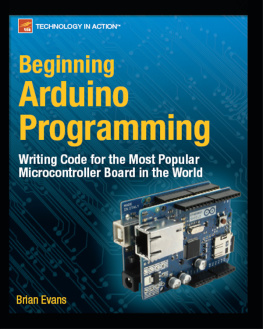
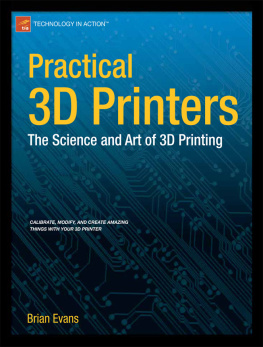
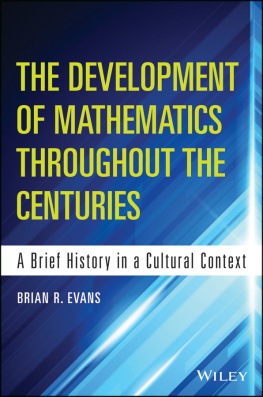
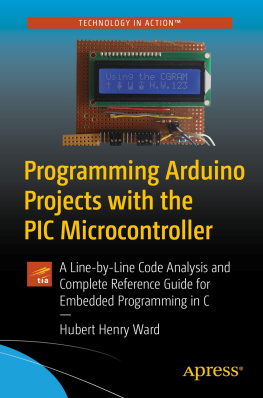
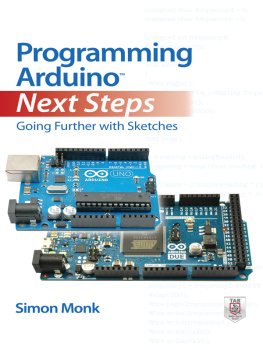
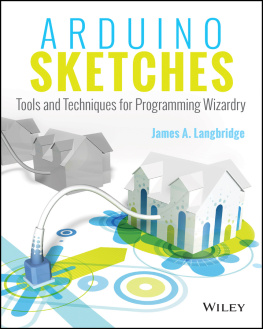

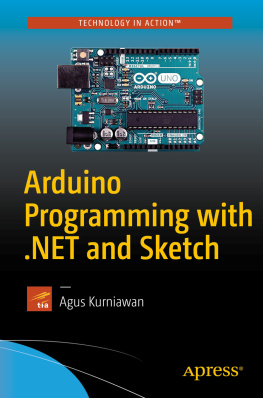
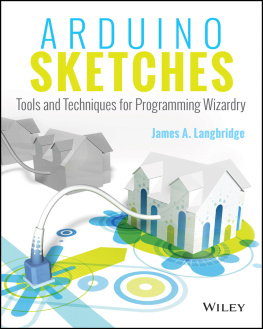

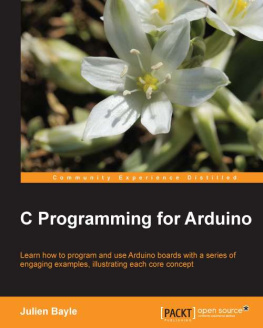
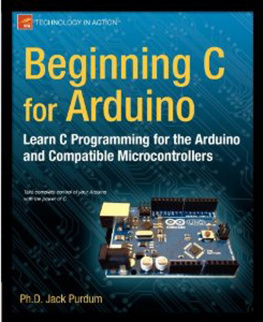



 Brian Evans is an artist working in electronic media and Assistant Professor at Metropolitan State College of Denver, where he teaches multidisciplinary courses in art and design on topics that include spatial media, electronics, and 3D fabrication. Many of his classes use open-source hardware, including MakerBot or RepRap 3D printers and the Arduino electronics platform, in the creation of new works in art and design.
Brian Evans is an artist working in electronic media and Assistant Professor at Metropolitan State College of Denver, where he teaches multidisciplinary courses in art and design on topics that include spatial media, electronics, and 3D fabrication. Many of his classes use open-source hardware, including MakerBot or RepRap 3D printers and the Arduino electronics platform, in the creation of new works in art and design.